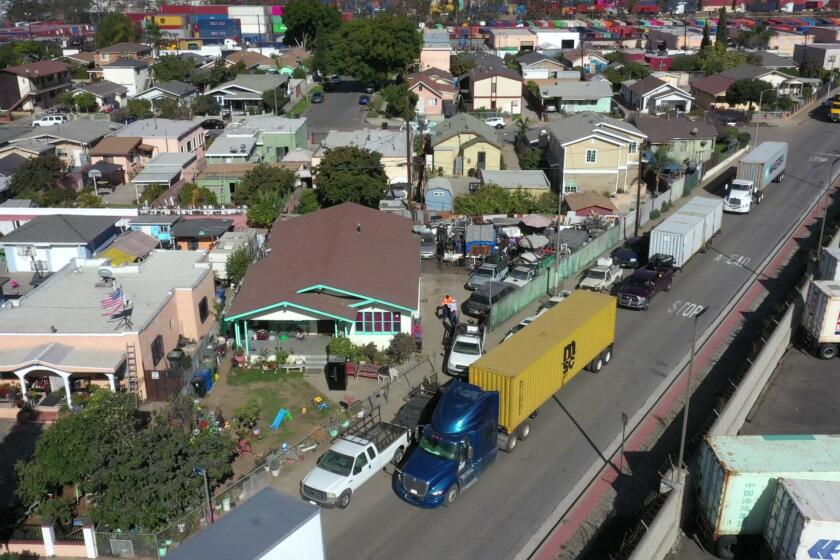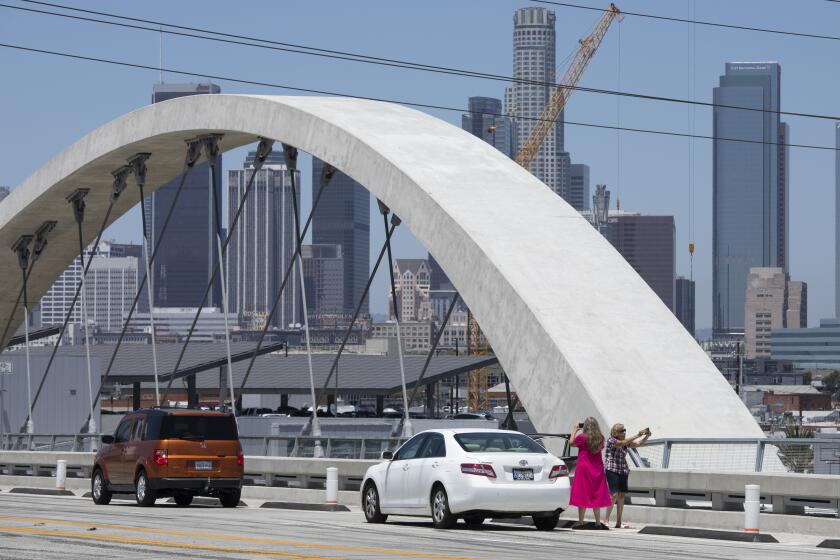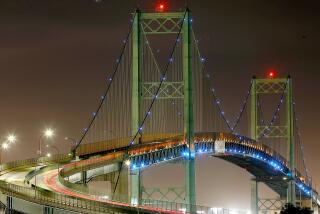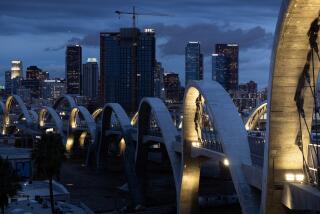Historic covered bridges are under threat by truckers relying on GPS meant for cars
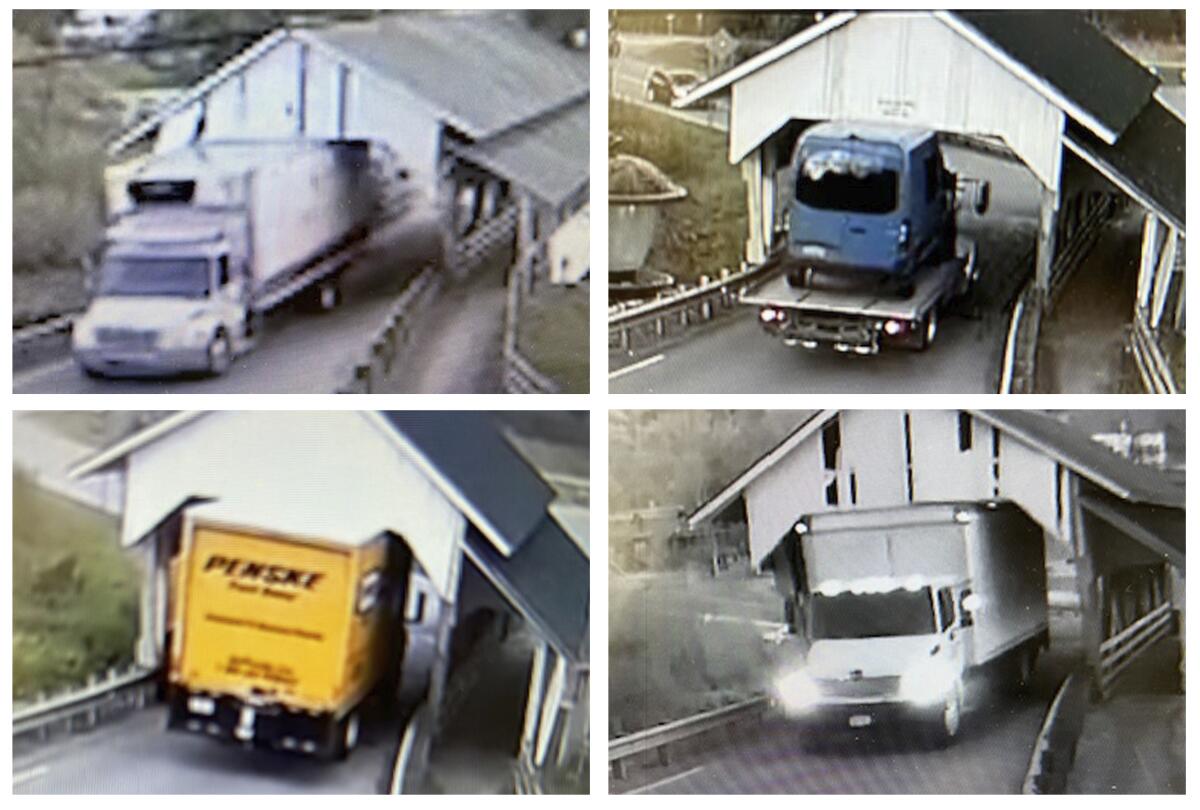
- Share via
LYNDON, Vt. — One of Vermont’s historic covered bridges has fallen under threat from modern technology.
Truck drivers relying on GPS directions continually crash through Lyndon’s 140-year-old Miller’s Run bridge despite signs, including a flashing one, prominently posted to deter vehicles that are too tall or too heavy from crossing. Drivers can face a fine of $5,000 from the town, plus state penalties.
Still, the bridge keeps getting whacked.
“GPS is the most general excuse that is given by drivers that do hit the bridge,” said Justin Smith, Lyndon’s municipal administrator. He says the real problem is lack of common sense.
The bridge, built in 1878 and renovated in 1995, lies on a shortcut motorists use to avoid downtown Lyndonville. The community, which has five historic covered bridges, including two that are in use, calls itself the “Covered Bridge Capital of the NEK,” short for Northeast Kingdom area, the nickname for that corner of the state.
Police Chief Jack Harris estimates the Miller’s Run bridge has been struck two dozen times, and at least once, twice in one day. The drivers are using GPS programs suited for cars rather than for commercial vehicles, he said. Typically the damage is cosmetic, though on two occasions the bridge had to be closed for several months for repairs, he said.
Residents of Drumm Avenue in Wilmington say truck traffic from the Port of Los Angeles makes them miserable.
In 2019, a delivery truck hit the supports and the engineering and repair costs were nearly $100,000, said Smith. About half the time, the town recoups insurance money from the drivers — if it catches them. Many just drive away.
“They will claim that they didn’t know they hit it and yet you’ll see the truck stop in the middle of the bridge and they’ll look up to see that they’re hitting the bridge,” Harris said. “I can count the number that have stopped and waited on one hand,” Harris said.
Many are inexperienced in driving trucks, such as people who may have just rented one to move, he said.
“Every now and then we’ll get a large camper being pulled through and those generally get damaged because the bridge will take air conditioning units right off the top,” he said.
A neighbor’s security camera trained on the bridge has helped track down some errant drivers.
Lyndon is far from alone, according to Bill Caswell, president of the National Society for the Preservation of Covered Bridges.
“You can visit many covered bridges throughout Vermont and other states and see broken boards on the portals and broken or missing roof braces,” he said by email.
Just two weeks in, yet another collision is reported on DTLA’s newly constructed 6th Street Bridge. Measures to stop the problems are in the works.
Last November, a tractor trailer truck seriously damaged a covered bridge in Princeton, Ill., and a bridge in Ohio was damaged in a similar way a year earlier, he said. A historic covered bridge in Cobb County, Ga., was struck numerous times until metal barriers were installed at each end, he said. It also has warning signs and flashing lights.
“Even with all the warnings, the barriers are still struck,” Caswell wrote. “But the bridge is now protected.”
A truck rental company in Lyndonville now warns drivers about covered bridges in the area, and the town is considering installing a steel beam in front of the bridge to force trucks that are too tall to a full stop.
A Google spokesperson said the Google Maps mobile app “is designed for drivers of standard-sized vehicles. To get the best routes, we encourage drivers of trucks and larger vehicles to use navigation tools designed specifically for those vehicle types.”
Apple did not respond to an email seeking comment.
There are mixed views in town about what to do, Smith said.
“Some people obviously want to see something that protects the bridge so we can keep it in place,” he said. “Others are like: ‘It’s time to take it off and set it on the side and put a more standard bridge in.”
“I swear, we could take that bridge out and not replace it and people would go in the river. It’s very frustrating to think that we are that set to what something tells us to do.”
Lisa Rathke writes for the Associated Press.
More to Read
Sign up for Essential California
The most important California stories and recommendations in your inbox every morning.
You may occasionally receive promotional content from the Los Angeles Times.
